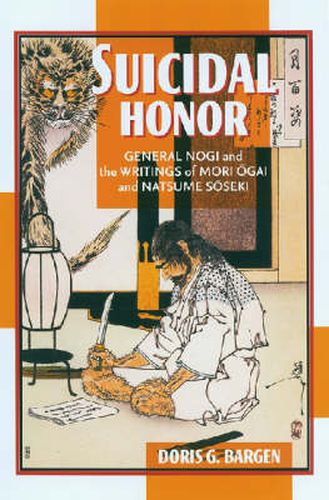Readings Newsletter
Become a Readings Member to make your shopping experience even easier.
Sign in or sign up for free!
You’re not far away from qualifying for FREE standard shipping within Australia
You’ve qualified for FREE standard shipping within Australia
The cart is loading…






On September 13, 1912, the day of Emperor Meiji’s funeral, General Nogi Maresuke committed ritual suicide by seppuku (disembowelment). The revered military hero’s wife joined in his act of junshi ( following one’s lord into death ). The violence of their double suicide shocked the nation. Doris Bargen, in the first half of her book, demonstrates that the deeper significance of Nogi’s action must be sought in his personal history, enmeshed as it was in the tumultuous politics of the Meiji period. In the second half of
Suicidal Honor , Bargen turns to the extraordinary influence of the Nogis’ deaths on two of Japan’s greatest writers, Mori Ogai and Natsume Soseki. Ogai’s historical fiction is a profound meditation on the significance of ritual suicide in a time of historical transition. The protagonist of Kokoro, Soseki’s masterpiece, refers to the general’s junshi before taking his own life. Scholars routinely mention this reference, but Bargen demonstrates the ways in which Soseki’s agonized response to Nogi’s suicide structures the entire novel. By exploring the historical and literary legacies of Nogi, Ogai, and Soseki from an interdisciplinary perspective,
Suicidal Honor
illuminates Japan’s prolonged and painful transition from the idealized heroic world of samurai culture to the mundane anxieties of modernity.
$9.00 standard shipping within Australia
FREE standard shipping within Australia for orders over $100.00
Express & International shipping calculated at checkout
On September 13, 1912, the day of Emperor Meiji’s funeral, General Nogi Maresuke committed ritual suicide by seppuku (disembowelment). The revered military hero’s wife joined in his act of junshi ( following one’s lord into death ). The violence of their double suicide shocked the nation. Doris Bargen, in the first half of her book, demonstrates that the deeper significance of Nogi’s action must be sought in his personal history, enmeshed as it was in the tumultuous politics of the Meiji period. In the second half of
Suicidal Honor , Bargen turns to the extraordinary influence of the Nogis’ deaths on two of Japan’s greatest writers, Mori Ogai and Natsume Soseki. Ogai’s historical fiction is a profound meditation on the significance of ritual suicide in a time of historical transition. The protagonist of Kokoro, Soseki’s masterpiece, refers to the general’s junshi before taking his own life. Scholars routinely mention this reference, but Bargen demonstrates the ways in which Soseki’s agonized response to Nogi’s suicide structures the entire novel. By exploring the historical and literary legacies of Nogi, Ogai, and Soseki from an interdisciplinary perspective,
Suicidal Honor
illuminates Japan’s prolonged and painful transition from the idealized heroic world of samurai culture to the mundane anxieties of modernity.